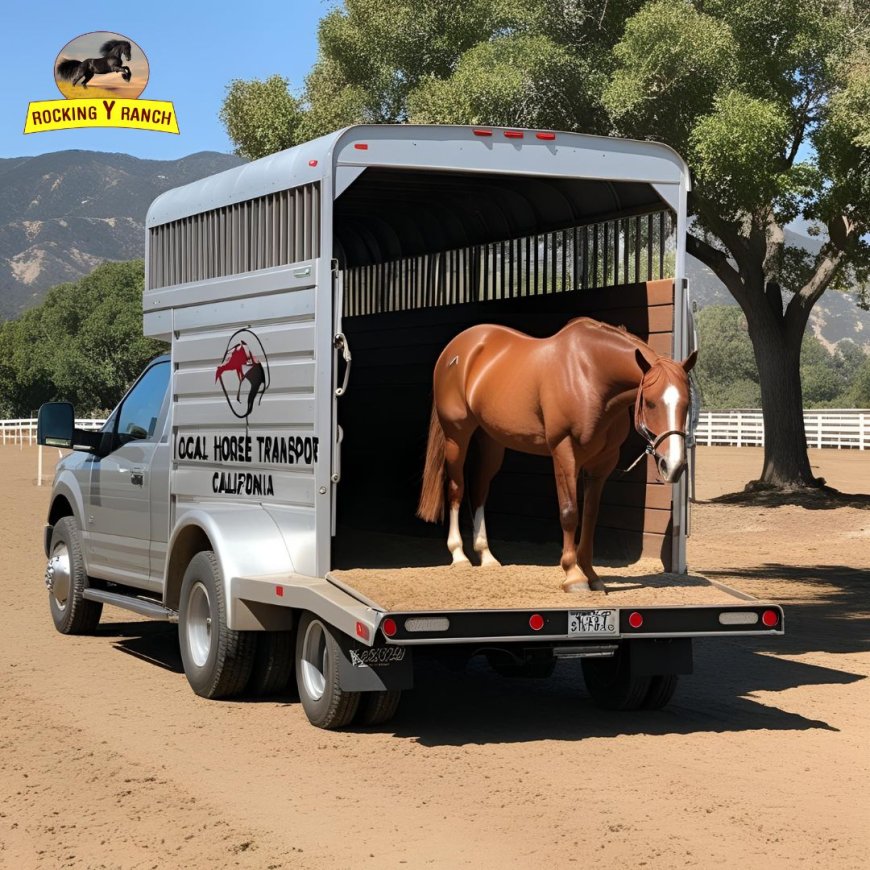Ensuring Safe and Reliable Local Horse Transport in California
Transporting horses safely and efficiently is a top priority for horse owners and equine professionals throughout California.

Transporting horses safely and efficiently is a top priority for horse owners and equine professionals throughout California. The vast and diverse terrain of the state — from coastal trails to inland ranches and equestrian centers — requires specialized local services that prioritize the well-being of horses while offering dependable and stress-free transport. Whether for a competition, relocation, veterinary visit, or a move between stables, local horse transport in California plays a vital role in the state’s thriving equestrian culture.
Understanding the Importance of Professional Horse Transport
Horses are sensitive and intelligent animals that require careful handling, especially during transportation. Unlike other livestock, they demand more than just basic care — they need calm, experienced handlers, proper equipment, and attention to detail to ensure they travel safely and comfortably.
Professional horse transporters are trained to handle horses with care and are familiar with the physical and psychological stresses horses may experience during travel. These experts ensure that the horses are loaded, transported, and unloaded in the safest and least stressful way possible. Local horse transport California services are especially critical in a large state like California, where even a "local" trip can span several hours through varying terrain and traffic conditions.
What to Look for in a Local Transport Service
Choosing the right local horse transport service involves more than selecting the nearest option. Here are some key factors to consider:
-
Experience and Reputation: Seek transporters who have years of experience handling different breeds and temperaments. Look for reviews or ask for references from other horse owners.
-
Horse-Centric Approach: The well-being of the horse should be at the forefront. Check if the transporter offers regular breaks, maintains a calm and quiet environment, and monitors the horse’s behavior and health throughout the journey.
-
Proper Licensing and Insurance: Professional transporters should have the appropriate licenses and insurance to protect both the horse and the owner. This includes vehicle registration for commercial use and liability insurance in case of unforeseen events.
-
Well-Maintained Equipment: The condition of the trailer or transport vehicle plays a significant role. It should be clean, ventilated, and equipped with features like non-slip flooring, padded walls, and safe partitions.
-
Clear Communication: Reliable transporters keep horse owners informed before, during, and after the journey. They should provide estimated travel times, pickup and drop-off windows, and immediate updates if any delays occur.
Common Reasons for Local Horse Transport
There are numerous scenarios in which horse owners may require local transport services within California. Some of the most common include:
-
Veterinary Appointments: For specialized care, such as surgery or diagnostic imaging, horses often need to travel to equine hospitals or clinics.
-
Relocation Between Barns: Whether moving to a new boarding facility, trainer, or private stable, local transport ensures horses arrive in good condition.
-
Competitions and Shows: California hosts a wide range of equestrian events, including dressage, show jumping, rodeos, and endurance rides. Reliable transport is essential for getting horses to and from venues on time.
-
Trail Riding Excursions: From coastal bluffs to Sierra Nevada trails, horse enthusiasts often transport their animals to scenic riding locations within the state.
-
Emergency Situations: Natural disasters, such as wildfires or floods, occasionally require urgent evacuation of horses. Local transporters familiar with the region are critical during such emergencies.
Preparing Your Horse for Travel
Even a short journey can be stressful for horses if they’re not adequately prepared. Here are a few steps owners can take to ensure a smooth trip:
-
Acclimate the Horse: If the horse is unfamiliar with trailers, spend time getting them used to the experience in a calm and gradual way.
-
Health Check: Make sure the horse is healthy and fit to travel. Keep necessary health documents on hand, including proof of vaccinations and a current health certificate if required.
-
Feed and Water: Hydration is crucial. Offer water before departure and make sure the horse has eaten several hours in advance to avoid travel-related digestive issues.
-
Secure Equipment: Halters and lead ropes should fit properly and be made of breakaway material in case of emergencies.
-
Monitor the Journey: When possible, ride along or stay in contact with the transporter to monitor the horse’s status during the trip.
California’s Unique Transport Landscape
California's size and geography present unique challenges and opportunities for horse transport. The diversity of the environment — from urban areas like Los Angeles and San Francisco to rural ranchlands and mountainous regions — demands flexibility and regional knowledge. Local transporters often develop routes and strategies that account for traffic congestion, road conditions, weather, and proximity to equestrian facilities.
In addition, California’s active equestrian community supports a wide range of disciplines and activities. Whether it’s Western performance, English riding, trail riding, polo, or therapeutic programs, the need for responsive and adaptable local horse transport continues to grow. The service isn't just about moving animals from point A to B; it's about facilitating an integral part of horse care and management.
Building Trust with Your Transporter
One of the most critical aspects of horse transport is trust. Building a relationship with a reliable local provider means having peace of mind that your horse is in good hands. Start by having an initial consultation, asking questions about their process, and, if possible, witnessing how they handle horses.
It’s also helpful to schedule trial runs or shorter trips to assess how your horse responds and how well the transporter communicates and operates. A dependable local horse transport service becomes a valued partner in your horse's overall care.
Conclusion
Local horse transport in California is an essential service that supports the health, performance, and safety of horses across the state. With the right preparation, a qualified transporter, and a commitment to the horse’s well-being, owners can ensure smooth and stress-free travel experiences. Whether for routine vet visits, competitions, or barn moves, choosing the right local transport provider helps ensure that every journey — no matter how short — is made with the highest standard of care.


























































































































![Are AI Chatbots Replacing Search Engines? AI vs Google [New Research]](https://www.orbitmedia.com/wp-content/uploads/2025/05/How-often-are-we-using-AI-chatbots_.webp)






































